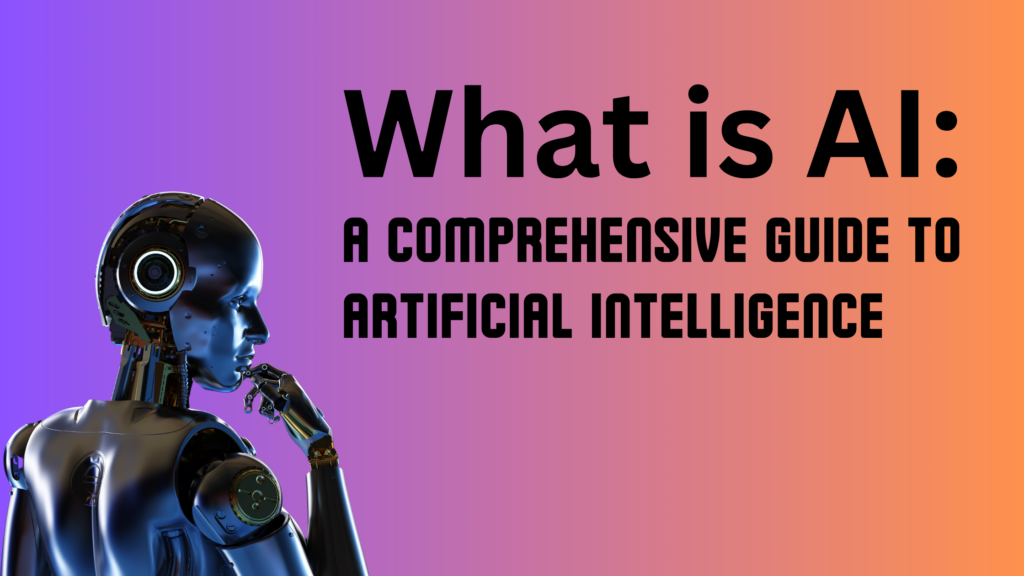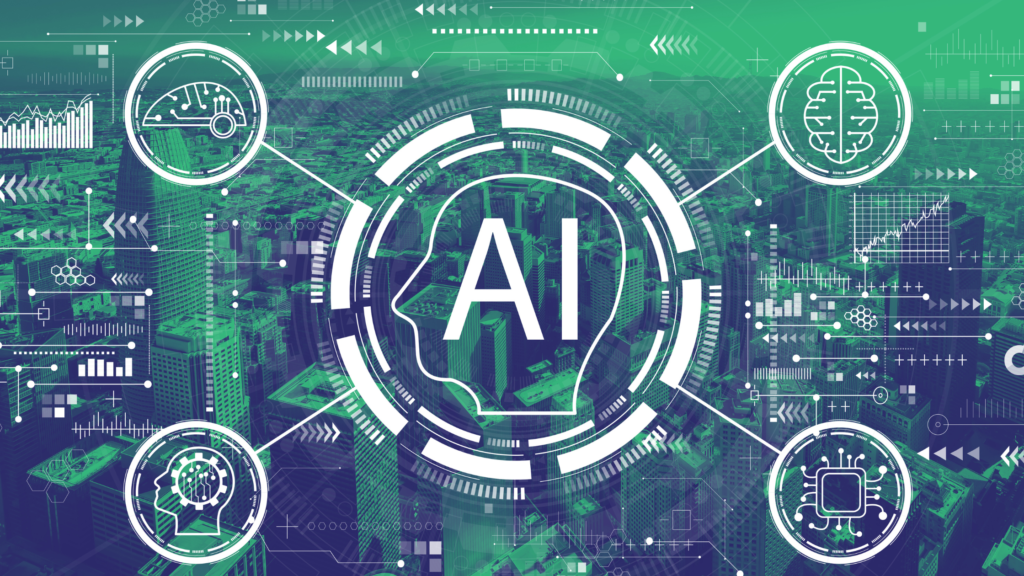The Power of Artificial Intelligence: Shaping the World Today and Tomorrow
7 min read
Artificial Intelligence (AI) is a rapidly advancing technology that enables machines to simulate human intelligence. From self-driving cars to voice assistants, AI is revolutionizing the way we live and work. Discover the fascinating world of AI and its limitless possibilities.
Introduction
In this modern era, the rapid advancements in technology have paved the way for Artificial Intelligence (AI) to revolutionize various aspects of our lives. From virtual personal assistants to self-driving cars, AI has become an integral part of our society. In this blog, we will explore, what is AI? the different types of AI, their importance, advantages and disadvantages, examples of AI technology, applications, ethical considerations, and the history of AI

What is AI
At its core, Artificial Intelligence refers to the ability of machines to mimic or simulate human intelligence. It involves the development of computer systems that can perform tasks that typically require human intelligence, such as understanding natural language, recognizing objects, solving problems, and learning from experience.
How does AI work?
AI systems rely on a combination of algorithms, data, and computing power to perform tasks. These algorithms are designed to process and analyze large amounts of data, learn from patterns, and make predictions or decisions based on that information.
- Machine Learning: Machine Learning is a subset of AI that focuses on enabling computers to learn from data without being explicitly programmed. It involves training algorithms on large datasets to recognize patterns and make predictions or take actions based on that information. Supervised learning, unsupervised learning, and reinforcement learning are common approaches within machine learning.
- Deep Learning: Deep Learning is a subset of Machine Learning that uses artificial neural networks to simulate the way the human brain works. These neural networks are composed of layers of interconnected nodes, known as neurons, that process and analyze data to make predictions or decisions. Deep Learning has revolutionized areas such as image recognition, natural language processing, and voice recognition.
Uses of AI
- AI in Healthcare: AI is revolutionizing healthcare by streamlining processes, improving diagnosis accuracy, and enabling personalized treatments. Machine learning algorithms can analyze large amounts of patient data to identify patterns and predict diseases. AI-powered robots assist in surgeries, increasing precision and reducing human errors. Additionally, AI-based chatbots provide 24/7 patient support, ensuring immediate responses and reducing the workload on medical staff.
- AI in Education: In the field of education, AI is transforming the traditional learning experience. Intelligent tutoring systems provide personalized learning paths to students, catering to their individual needs and abilities. AI-powered virtual assistants help automate administrative tasks, allowing educators to focus more on teaching. Furthermore, AI-driven algorithms analyze student performance data, helping educators identify areas of improvement and create effective teaching strategies.
- AI in Finance: AI has revolutionized the financial sector by automating processes, improving fraud detection, and enhancing customer service. Machine learning algorithms analyze vast amounts of financial data to predict market trends, helping investors make informed decisions. AI-powered chatbots assist customers with their financial queries, providing quick and accurate responses. Additionally, AI algorithms detect suspicious financial activities, helping prevent fraudulent transactions.
- AI in Transportation: The transportation industry is benefiting greatly from AI technology. Self-driving cars, powered by AI algorithms, are being developed to reduce accidents and improve traffic flow. AI-powered traffic management systems analyze real-time data to optimize traffic signals, reducing congestion and travel time. Furthermore, AI algorithms assist in logistics management, optimizing routes, and reducing delivery costs.
- AI in Entertainment: AI has transformed the entertainment industry, providing personalized recommendations and enhancing user experiences. Streaming platforms use AI algorithms to analyze user preferences and suggest relevant content. AI-driven virtual reality (VR) and augmented reality (AR) technologies provide captivating gaming encounters. Additionally, AI-driven chatbots engage with users, providing instant customer support and enhancing user satisfaction.
Types of AI
The classification of Artificial Intelligence encompasses four main types:
- Reactive Machines: These AI systems lack memory and the capacity to learn from previous experiences. They simply react to specific inputs. Examples include Deep Blue, the chess-playing computer, and AlphaGo, the AI program that defeated world champion Go player Lee Sedol.
- Limited Memory: These AI systems have the ability to learn from historical data and make informed decisions based on that knowledge. Self-driving cars and virtual assistants like Siri and Alexa fall into this category.
- Theory of Mind: This type of AI aims to develop machines that can understand human emotions, intentions, and beliefs. While still in the early stages, this type of AI holds promise for applications in fields like psychology and customer service.
- Self-Aware AI: This is the most advanced form of AI, where machines possess consciousness and self-awareness. However, we have not yet achieved this level of AI development.
Importance of Artificial Intelligence
Artificial Intelligence has become increasingly important due to its potential to improve efficiency, accuracy, and decision-making across various industries. Some key reasons why AI is important are:
- Automation and Efficiency: AI technologies automate repetitive tasks, freeing up human resources to focus on more complex and creative work. This results in heightened productivity and efficiency within business operations.
- Decision-Making: AI systems can analyze vast amounts of data and provide valuable insights that help in making informed decisions. This has significant implications in healthcare, finance, and other sectors where data-driven decision-making is crucial.
- Personalization: AI enables personalization by understanding user preferences and delivering tailored experiences. This is apparent in recommendation systems utilized by platforms such as Netflix and Amazon.
Advantages and Disadvantages of AI
Advantages
- Precision and Accuracy: AI systems can perform tasks with unparalleled precision and accuracy, reducing the chances of errors or mistakes.
- Efficiency and Productivity: AI automates mundane tasks, leading to increased productivity and efficiency in various industries.
- Accessibility: AI-powered technologies have the potential to make significant advancements in healthcare, education, and other sectors, making services more accessible to people worldwide.
Disadvantages
- Job Displacement: The automation of certain tasks by AI might lead to job losses in certain industries, requiring a shift in workforce skills.
- Lack of Emotional Intelligence: AI lacks human emotions and empathy, which can hinder its ability to understand complex human interactions and emotions.
- Ethical Concerns: The rapid evolution of AI raises ethical questions regarding privacy, security, and bias in decision-making algorithms.
Strong AI vs Weak AI
Strong AI refers to AI systems that can exhibit human-like intelligence and consciousness. Weak AI, on the other hand, refers to AI systems that are designed for specific tasks and lack general intelligence. While strong AI remains a theoretical concept, weak AI has seen significant advancements and practical applications. and Current Applications.
Examples of AI Technology and Current Applications
AI technology is used in various domains, including:
- Natural Language Processing (NLP): NLP enables machines to understand and respond to human language, powering applications like virtual assistants and chatbots.
- Computer Vision: This field focuses on enabling machines to interpret and understand visual information, used in facial recognition systems, object detection, and autonomous vehicles.
- Robotics: AI is integral to the development of advanced robots capable of performing complex tasks in industries like manufacturing, healthcare, and agriculture.
Ethical Use of Artificial Intelligence
The ethical use of AI is crucial to ensure its responsible and fair deployment. Key considerations include:
- Privacy and Security: AI systems must adhere to strict privacy and security guidelines to protect user data and prevent unauthorized access.
- Transparency and Explainability: The decision-making processes of AI systems should be transparent and explainable to prevent bias and ensure accountability.
- Fairness and Bias: Developers must ensure that AI systems are trained on diverse datasets and avoid perpetuating biases or discrimination.
AI Governance and Regulations
To mitigate the ethical and social risks associated with AI, robust governance and regulations are required. Governments, organizations, and industry leaders must collaborate to establish frameworks that guide the development, deployment, and use of AI technologies.
- Transparency and Accountability: AI algorithms should be transparent, providing explanations for their decisions and actions. Auditing systems should be in place to ensure accountability and prevent the misuse of AI.
- Data Privacy and Security: Strong data privacy laws and regulations are essential to protect individuals’ personal information from misuse. AI systems should prioritize data security and comply with relevant privacy regulations.
- Bias and Fairness: Developers should strive to minimize biases in AI systems by using diverse and representative datasets, conducting regular audits, and implementing bias-detection mechanisms.
- Human Oversight: Maintaining human control and decision-making in AI systems is crucial. Human oversight ensures that AI technologies are used ethically and responsibly, preventing the potential harm caused by autonomous systems.
Conclusion
Artificial Intelligence has already made a significant impact on various industries and continues to shape our world today. With ongoing advancements, it holds the potential to transform industries, enhance decision-making, and improve the overall quality of life. However, ethical considerations, governance, and regulations are essential to ensure responsible and beneficial use of AI in the future. As we move forward, it is crucial to strike a balance between harnessing the power of AI and addressing the ethical and societal implications it presents.
If you’re interested in learning more about AI and staying updated on the latest advancements, be sure to visit our website (AllThingsInternet), where we regularly publish informative and insightful articles on AI and related topics.
Additionally, if you’re looking to leverage the power of AI to boost your digital marketing efforts, consider partnering with our digital marketing agency Digit’o Services.
So, whether you’re a beginner intrigued by the world of AI or a business owner seeking innovative marketing solutions, our blogging website and digital marketing business are here to guide you on your journey. Embrace the power of AI and embark on a path towards success today!




